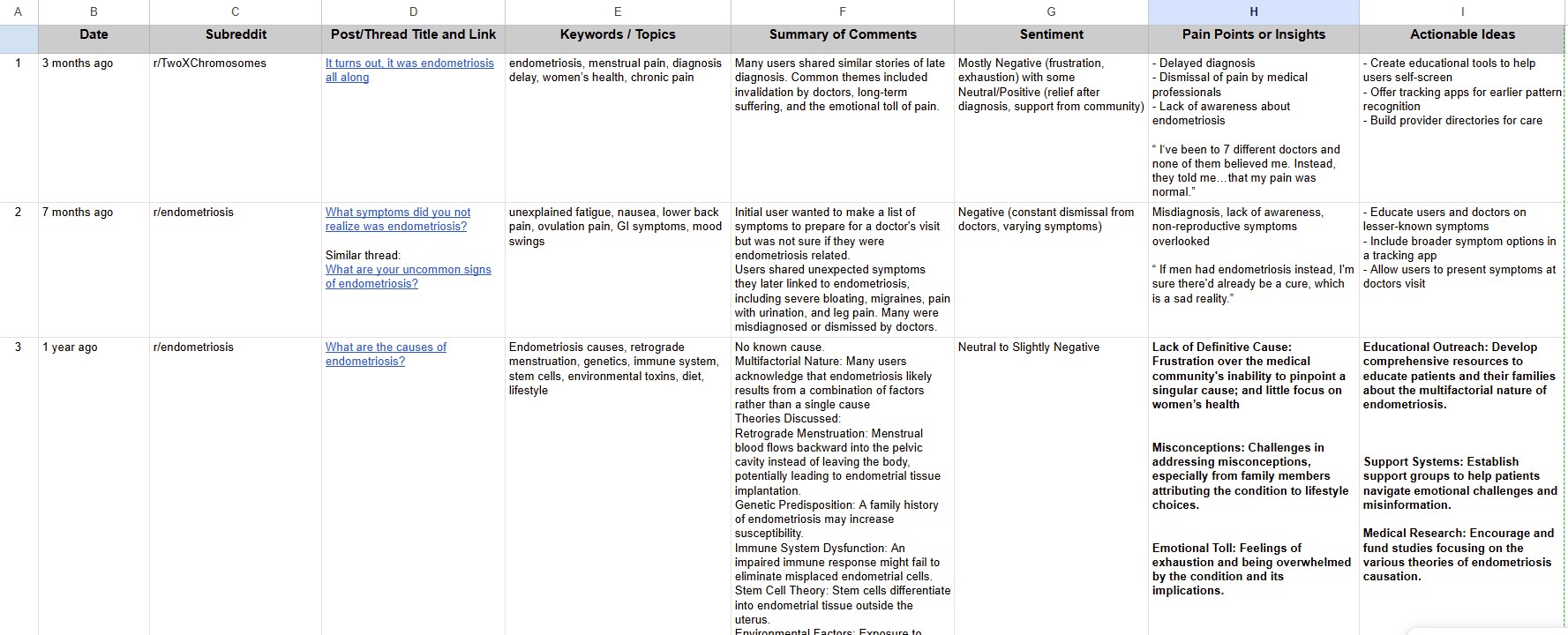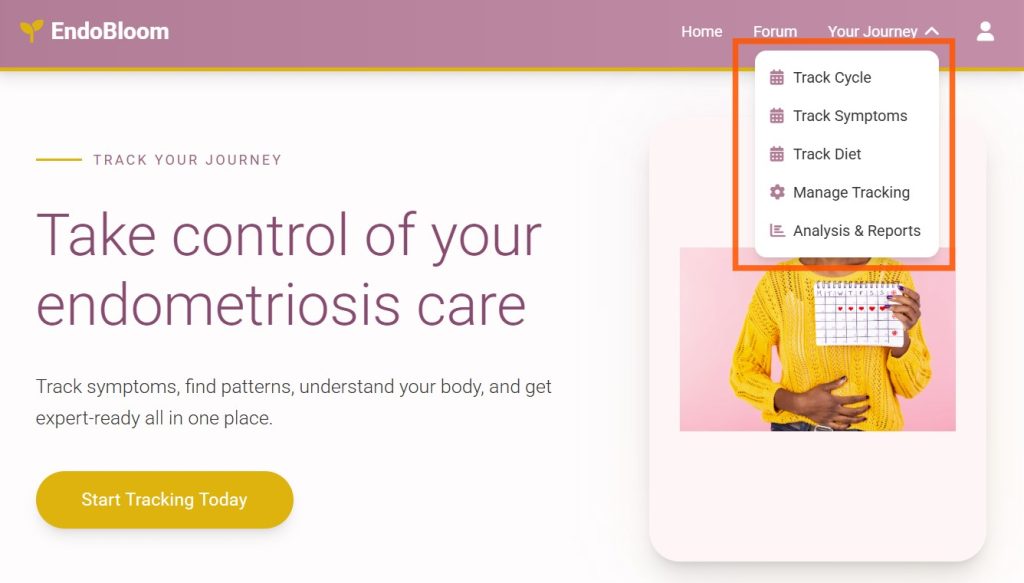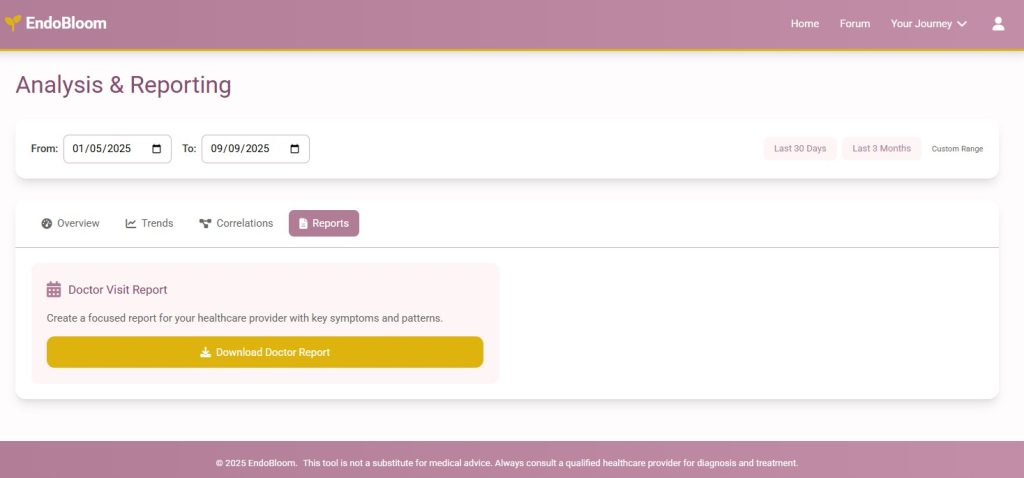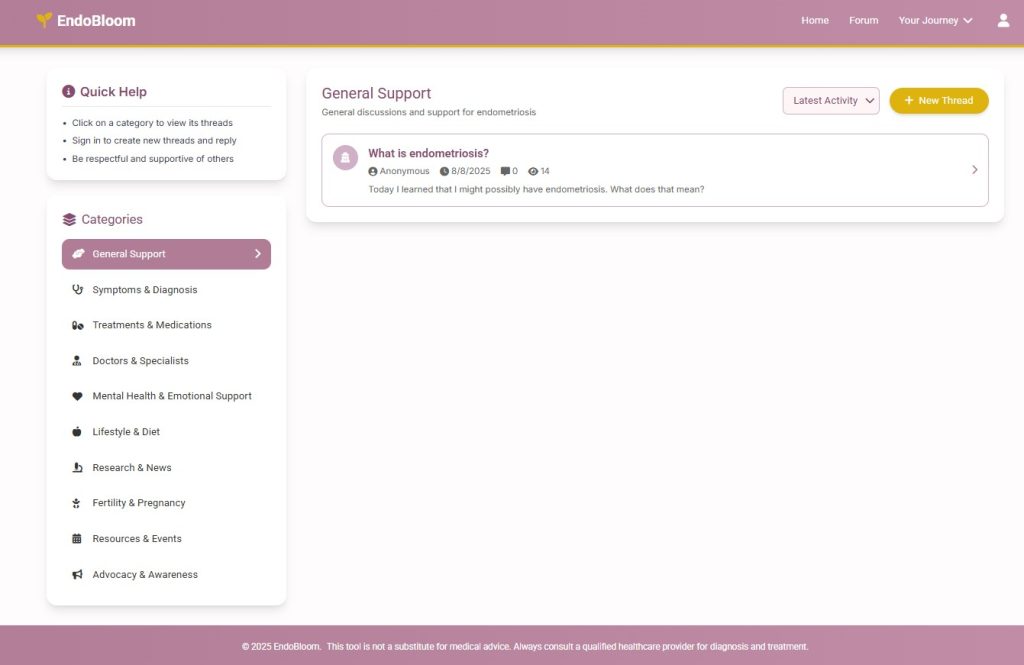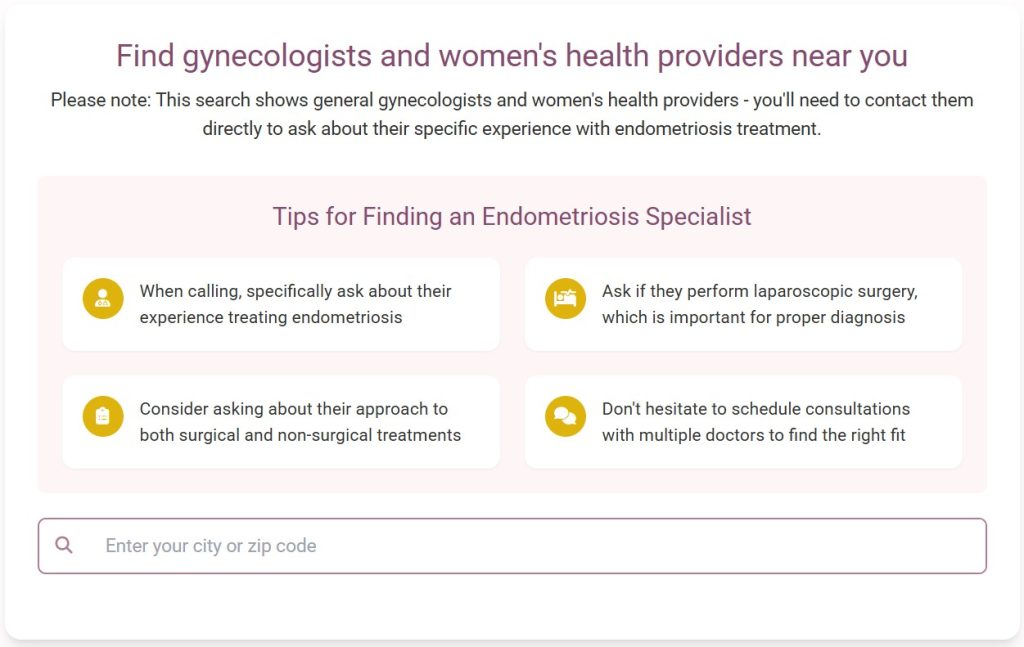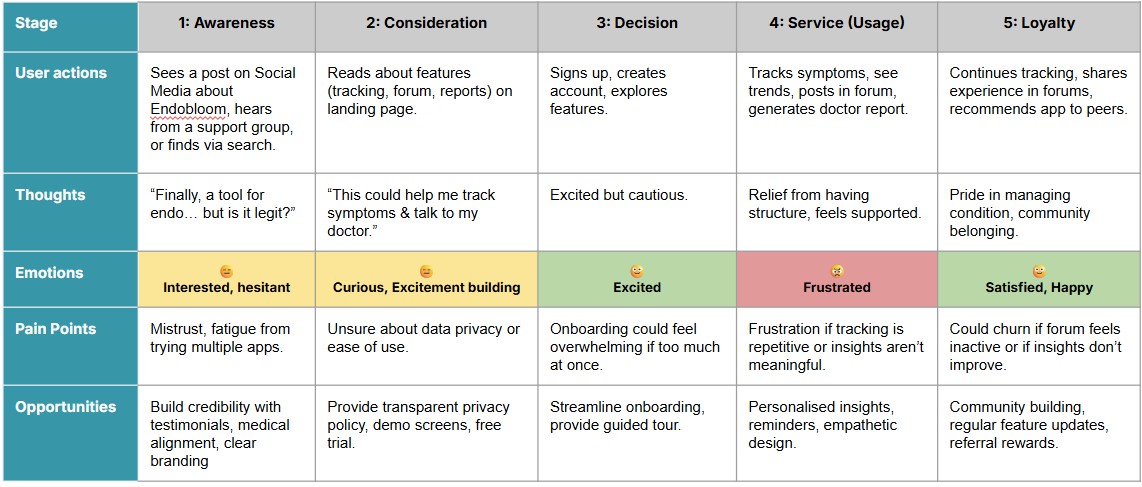Empowering Women With Endometriosis
EndoBloom is a concept for a digital support app designed to help people with endometriosis track and manage symptoms and connect with a supportive community. Using Reddit social listening and AI-assisted prototyping, I identified key user needs and pain points to inform an empathetic and user-centred design for improving the quality of life for those affected by this chronic condition.
UX Research Lead and Prototype Developer
May – June 2025
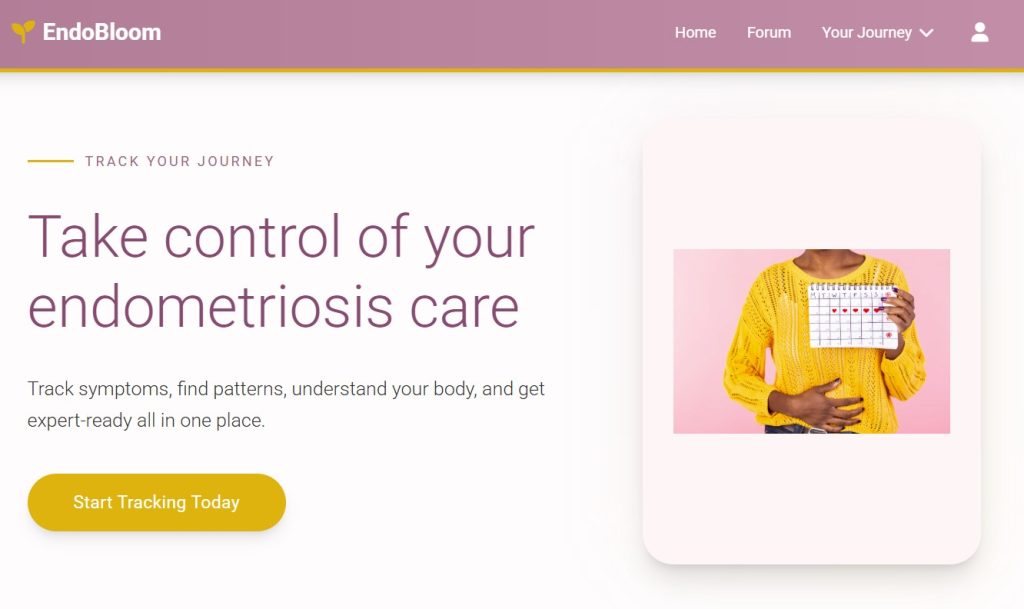
The primary research objective was to understand the challenges, needs, and behaviours of individuals living with endometriosis by analysing authentic user conversations and online communities to inform an app that can support and empower these women. The three research questions guiding the study included:
- What are the main pain points and unmet needs for those living with endometriosis?
- How do users seek information and community support?
- What features would encourage consistent app use and engagement?
A lean, research-driven approach was taken to capture real user voices, distill key problems, and rapidly visualise solutions through AI prototyping.

Social Listening
To understand the experiences of people with endometriosis, I conducted social listening across multiple Reddit communities dedicated to the condition.
These forums provided unfiltered conversations where individuals shared their daily struggles, frustrations with healthcare, and unmet needs.
This approach helped surface authentic perspectives outside of formal research settings, providing raw insights into pain points and gaps in support.


Problem Extraction & Analysis
From posts and comments, I manually extracted recurring patterns and themes, focusing on areas such as pain management, emotional support, access to specialists, and lifestyle impacts.
By clustering quotes and observations, I identified not only common frustrations (for e.g. difficulty finding specialised doctors) but also opportunities where digital tools could provide meaningful support.
This thematic analysis created a clear picture of priority problem areas to address in the prototype.

App Concept & Rapid Prototyping
Using these insights, I documented an initial prototype concept highlighting four core MVP features and a high level roadmap for future phases.
Leveraging AI tools, I rapidly created a concept prototype that included features such as doctor search, symptom tracking, and peer community support, all reflecting themes uncovered in the research.
Social Listening
The research surfaced clear patterns in user challenges, highlighting unmet needs and opportunities for innovation.

What The Endometriosis Community is saying on Reddit?
"I've been to 7 different doctors and none of them believed me. Instead, they told me...that pain was normal."
“I went to doctors for FIFTEEN YEARS complaining of pain…missing days of school and then work every month and doctors repeatedly said to me exactly what you said. They dismissed my pain and told me it was normal.”
“If men had endometriosis instead, I'm sure there'd already be a cure, which is a sad reality.”
“They almost killed me, they left me bedridden for nearly 5 years. I had to get out of my area...and a competent gyno with a specialism in endo saved my life. It was 9/10 pain. I was ignored, neglected and denied… investigation.”
“...Some people have to self diagnosed because they do not have any access to or reliable access to healthcare”
Problem Extraction & Analysis
A summary of women’s key concerns and pain points when it comes to endometriosis is below:
- Lack of Awareness: Limited understanding among the public and healthcare professionals
- Delayed or Misdiagnosis: Often mistaken for other conditions due to poor knowledge and symptom overlap. Takes 7 to 10 years to diagnose
- Dismissal of Pain: Patients’ symptoms are frequently minimised or ignored by medical providers
- Overlooked Non-Reproductive Symptoms: Focus remains narrowly on fertility, missing broader health impacts
- Invasive Diagnosis: Surgical confirmation (laparoscopy) is often required, delaying timely care
- Limited Access to Specialists: Scarcity of trained professionals leads many to self-diagnose
- Insufficient Research & Funding: Women’s health, especially endometriosis, is under-researched
- Emotional Impact: Long diagnostic journeys cause frustration, isolation, and mental health struggles
- One-Size-Fits-All Care: Lack of personalised treatment plans tailored to individual needs
- Silent Progression: The disease can advance significantly without obvious symptoms
- Inconsistent IVF Guidance: Varying medical opinions on managing endometriosis alongside fertility treatments
“Roughly 10% (190 million) of reproductive age women and girls globally are affected by endometriosis. Despite this many women remain underdiagnosed, misunderstood, and under-supported.”
– World Health Organization
Based on the insights and findings, I designed a dedicated app, Endobloom, that aims to empower users and women. The design of the app was guided by a set of design principles to ensure the user experience is empathetic, accessible and impactful:
- Empathetic & Empowering: Validates user experiences while supporting medical conversations
- Simple & Low-Friction: Logging symptoms takes under 2 minutes, mindful of pain and fatigue
- Inclusive & Accessible: Non-clinical, welcoming language for diverse users
- Medically Relevant: Data designed to support both personal insights and doctor consultations
- Personalised & Flexible: Adapts to individual endo journeys with optional depth
- Clear Visual Feedback: Patterns made easy to understand with simple charts
- Safe Early AI Integration: Uses rule-based insights for transparency and safety
- Adaptable & Scalable: Future-proofed for AI, languages, and global usability
- Private & Secure: Protects sensitive health data with clear safeguards
With AI, I created the first prototype of EndoBloom. The details below outline the four core features that form the foundation of the app.
Track Cycle, Symptoms and Diet. Spot Patterns
Endometriosis symptoms vary wildly and unpredictably. Logging helps users recognise what is normal for them and uncover trends with AI assistance.
Users can track their cycle by logging start and end dates, flow intensity, spotting before or after periods, irregular cycles, and additional notes.
They can also record symptoms including pain location, intensity, timing, sleep quality, mood, anxiety or stress level, activity levels, missed work or cancelled plans, medications taken, triggers, and extra notes.
Diet tracking allows logging of meal type, meal details, key ingredients, supplements, hydration, and notes. All entries can be viewed, edited, or deleted through a calendar interface.
Users can uncover trends and hidden patterns with visualisations, filtered by date range or quick options like “Last Month” or “Last 3 Months.”
Insights include pain symptom timelines, symptom occurrence patterns (on and off cycle), correlations between sleep and pain or other symptoms, and connections between diet and pain or other symptoms.
Prepare for Doctor Visit
Many users struggle with being taken seriously. This feature aims to help the user adequately prepare for their visit. It generates personalised summaries to communicate clearly and confidently
The prototype enables users to create a comprehensive summary report of their health to bring to doctor appointments.
The report includes cycle overview, symptom tracking, medications and supplements, lifestyle and diet factors, the impact on daily life, and space for notes and questions for the doctor.
Learn From And Leverage Real Community Insights
Informed by the experiences of the endo community, this aims to educate and empower users and women more about endometriosis and learn from others’ experiences.
A forum feature was designed to provide a safe, supportive space for people with endometriosis to share experiences and advice.
Non-users can browse threads, while registered users create or respond to discussions. To protect privacy, posts use nicknames with an option for anonymity.
Content is organised into categories (for e.g. symptoms, treatment, mental health, fertility, advocacy), and threads display key details like author, date, comments, and views. Sorting by most recent, most liked, or most viewed helps surface timely or popular topics.
Find Specialists Nearby
Access to trustworthy and reliable specialists is a huge pain point for users. This feature quickly locate trusted endometriosis experts in nearby areas.
The prototype allows users to search for gynecologists by city or ZIP code, with results displaying names and contact information.
To support informed choices, users are guided on what to look for when selecting an endometriosis specialist. In future iterations, EndoBloom would introduce verified tags for specialists to increase trust and confidence in care.
Product Roadmap
I created a high level product roadmap to guide the phased strategy for building and scaling EndoBloom, ensuring priorities stay align with user needs.
Phase 1: MVP Features
- Core Security & Accounts: Basic sign-up, login, and password management
- Profile Management: Capture essential user info
- Data & Policies: Terms of use, privacy policy, and basic consent management
- Find Specialists: Search for gynecologist with guidance for selecting those experienced with endometriosis
- Community Forums: View forums with ability for registered users to create/respond to threads, sort/ filter, receive email notifications, anonymity options
- Tracking: Log cycles, symptoms, diet, and some lifestyle factors with calendar view / edit / delete capabilities
- Insights & Visualisations: Early trend detection (pain timelines, other symptoms frequency, diet / sleep correlations)
- Doctor Preparation Tools: Auto-generated report summarizing symptoms, lifestyle impact, and key questions
Phase 1.5: Research and Go-to-Market
- Conduct usability testing with pilot user
- Refine MVP features
- Develop business and go to market plan
- Initial Launch
Phase 2 and Beyond: Enhanced and New Features
- Security: Two-factor authentication, account deactivation
- Profile Management: Notifications and reminders to log regularly
- Find Specialists: Known specialists tagged and listed first, with address, phone number and website if available
- Expanded Tracking: More detailed symptom, mood, diet and lifestyle logs
- Deeper Analytics: Richer correlations and insights based on user data and research feedback
- Treatment Journal: Track medications, surgeries, outcomes, and side effects
- Learning Centre: Provide trusted resources and content on endometriosis, its symptoms, treatment and lifestyle support

Working on EndoBloom was a formative experience that strengthened my design and problem-solving skills in healthcare. I learned to balance simplicity with medical relevance, making the app approachable for users in pain while collecting meaningful data for clinical conversations.
For prototyping, I used a vibe coding approach with AI, which allowed rapid iteration and experimentation. While it accelerated development, AI could be unpredictable, sometimes breaking functionality or overwriting work, requiring careful validation and adaptability.
Overall, the project reinforced that healthcare design must centre human needs, and that AI-assisted vibe coding is a powerful but imperfect tool for exploring solutions quickly.
